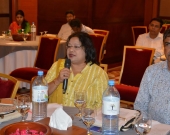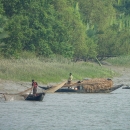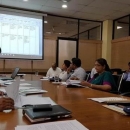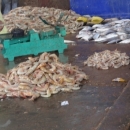Topics :: Apply knowledge :: Economic Valuation
Economic Valuation
Around the world, every day, coastal zones and mangroves provide natural resources and services to local people in the form of food and income. In Southeast Asia it is believed that reef based fisheries alone generate incomes of nearly 4 billion dollars per year. In Thailand for example, according to a study done by United Nations Environment Programme (UNEP), the value of mangroves has been estimated to 3.5 million dollars per sq. km per year. Protection of coastal ecosystems and mangroves thus becomes important not only from an ecological standpoint but also makes good economic sense.
There is growing recognition that mangroves and other coastal ecosystems should be valued in monetary terms as assets that can yield repeated economic benefits. While the roles of industries like fisheries and tourism on coastal economies are well known, their contributions to national economies and inter-linkages with livelihoods of people and poverty reduction is still poorly understood.
As the global community becomes more aware about coastal ecosystems and their economic value, it is important to promote investment in their conservation and management. MFF seeks to address this subject by expanding and improving upon the knowledge base surrounding coastal ecosystems and economy. It works to ensure that these values are built into developmental plans and policies of countries and regions. MFF promotes this idea by developing tools that help find better ways to use coastal ecosystem resources.
For details about Actions, Outputs and Results, click [ + ]
Related News
International Year of the Reef: Joining forces to fight for the health of our oceans
Phuket, Thailand 25 Jul 2018
Country: Thailand
Topic: Capacity Building, Coastal Governance, Economic Valuation ...
“Collaboration,” “Education” and “Innovation” are three words that summed up a workshop on 20 July aimed at promoting best practices in coastal and marine conservation among the private sector.
Bangladesh celebrates biodiversity and tourism
Dhaka, Bangladesh 21 May 2017
Country: Bangladesh
Topic: Capacity development, Coastal Governance, Economic Valuation ...
A well-managed ecosystem provides an important foundation for many aspects of tourism. Tourism revenue, in turn, can contribute to the maintenance, protection and conservation of key wildlife populations – which is why the theme of this year’s Intern...
Marriott and MFF: The power of private sector partnership
Bangkok, Thailand 14 Jun 2016
Country: Asia Region, Thailand
Topic: Capacity Building, Climate change, Coastal Governance ...
Through Mangroves for the Future (MFF), IUCN established a partnership with Marriott Hotels & Resorts to protect the environment and support Thailand’s local communities through mangrove restoration, the use of sustainable seafood sources and local ...
Featured Projects
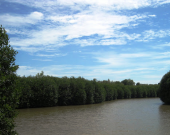
Income for coastal communities for mangrove protection
Duration:
Location: Coastal communities in Pakistan, Thailand, and Viet Nam
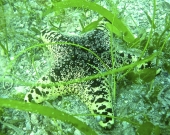
Living resources of the Gulf of Mannar: Assessment of key species and habitats for enhancing awareness and for conservation policy formulation
Duration: 24.5 months
Location: Gulf of Mannar
Topics: Knowledge for Management , Marine Protected Areas , Economic Valuation , Strategies for Management , Capacity Building , Integrated Coastal Planning , Community Resilence
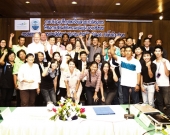
Strengthening the Community-based Coastal Resources Management Network through Community-based Learning Centers in Six Sub-districts of Trat Province, Thailand
Duration: 24 months
Location: Muang and Laem Ngob districts, Trat province
Topics: Capacity Building , Civil Society Engagement , Strategies for Management , Economic Valuation , Sustainable Livelihoods , Community Resilence , Financing Coastal Conservation , Capacity development
Featured Film - Krida Wana Lestari as one of grantee for MFF Indonesia phase-2
Krida Wana Lestari as one of grantee for MFF Indonesia phase-2, Bogor, West Java & Kampung Laut, Cilacap, Sentral Java, Indonesia © MFF Indonesia & Krida Wana Lestari@2012, 2012
This is short movie about the Small Grants Fund project selection process for MFF Indonesia phase-2. Krida Wana represented by Mr. Wahyono (Head)) and Ms. Utami (Sarinah Center) has explained their proposal concept during the PCM Training on 14-15 May 2012. NCB Indonesia did the field verification at Kampung Laut, Cilacap. Krida Wana was then selected as grantee for MFF Indonesia phase-2 . They will run the project until April 2013. (8months)
Related Events
MFF Phase 3 Regional Completion Workshop
Bangkok, Thailand 17 Dec 2018
MFF Phase 3 National Completion Workshops
Each MFF country 01 Nov 2018
REDD+ Regional Consultation Workshop
Bangkok, Thailand 4 Jun - 05 Jun 2018
Related Images
Related Publications
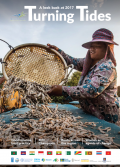
Turning Tides Magazine
2017 in Review
Author: Various
Publisher: MFF
Posted on: 31st Jul 2018
Category: Asia Region (Secretariat)
Size: 9.1 MB
Valuation of Mangroves in PQA Indus Delta: An Econometric Approach
Author: Institute of Business Management Karachi, Pakistan
Posted on: 7th Dec 2017
Category: SGF (Small Grant Facility)
Size: 4.8 MB

